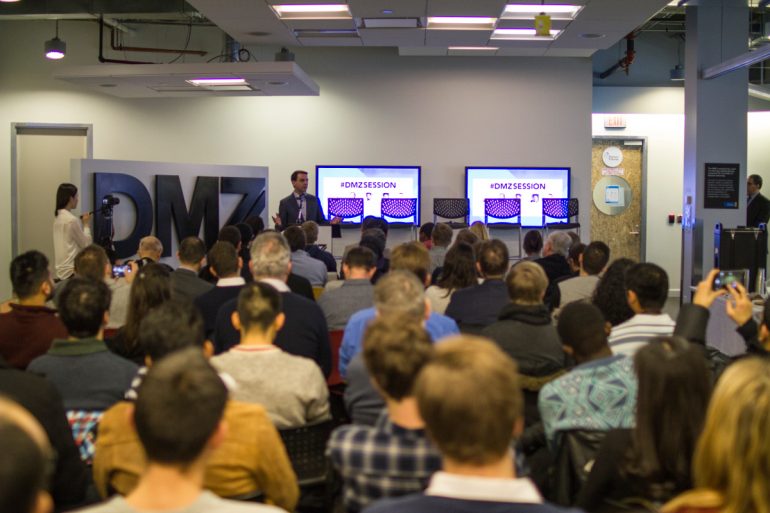As Toronto prepares to host NBA All-Star Weekend — the first outside the United States — taxis warned that they would protest that weekend against Uber (before deciding to cancel the protest), a company that’s become symbolic of the inevitable rise of the sharing economy.
Fittingly, the DMZ hosted a sharing economy panel featuring people from all levels of industries affected by the sharing economy, including Tim Hudak, MPP and former leader of the Progressive Conservative Party; Chris Schafer, Policy Lead at Uber Canada; Brian Kobus, director at OMERS Ventures; and Grant Brigden, founder of parking spot app Rover.
Schafer said that while the idea of the sharing economy isn’t new, the scale that it’s reached is what’s getting so much attention.
“I know my dad would tell me to go to the neighbour and borrow a rake across the street. People have been doing that for a long time but you couldn’t walk down three blocks around the corner and knock down a stranger’s door and expect the same result,” Schafer said. “What you can do now on a platform like uber or other platforms is access the world in real time and share resources that you no longer have to own.”

Hudak, who put forth a private member’s bill in parliament dedicated meant to fully recognize sharing economy industries like ridesharing, homesharing, and parking sharing as legitimate businesses, often voiced his support for these burgeoning industries despite the fact that the government has been slower to be as accepting. He believes that these industries are key to fostering economic growth.
“Hopefuly the next Uber or AirBnB. I want to see these companies be successful and I want to see these companies as an export industry,” said Hudak. “I want to see them expand across the world with their headquarters right here, in Ontario, and give back here.”
But Schafer agreed that the government does have some role in ensuring that sharing economy startups remain accountable, as they have access to a huge database of user data. “There’s no doubt a role for the government to set the table from a regulatory or consumer protection perspective; what is required to protect consumers and ensure public safety? What is required for data and privacy protection?” he said.
Kobus agreed that having policies dedicated to fostering innovation in these spaces, rather than hindering it, also makes investing in the region more feasible. But he admitted that not every single area is ripe for sharing disruption. “Anytime you have this low-use, high-cost dynamic with assets, it’s probably something that lends itself to the sharing economy type of business model,” he said. “There’s probably a line beneath that, though, where the economic model doesn’t make sense, so the market is relatively new and there’s lots of innovation were gonna see here.”
When Rover first launched, they made headlines as the government immediately declared the service illegal. While Hudak’s bill absolved them of those concerns, Brigden remains optimistic about governments being less fearful of sharing economies. “We launched and the reaction from the government was very much to back away. It was like a knee-jerk reaction where they said no you can’t do that without really understanding the details of what we want to accomplish,” said Brigden. “I’ll say now that it’s changed, it’s very much a lean-in type of scenario.”
Feature photo courtesy Keifer Wiseman, story photo courtesy Brian de Rivera Simon


